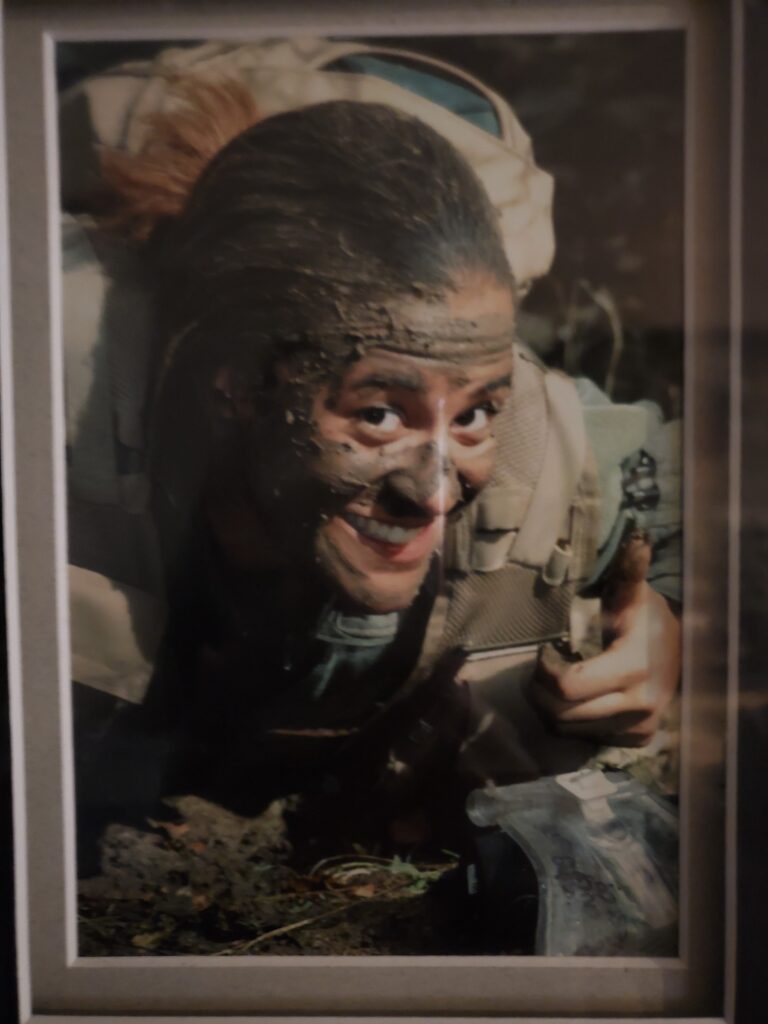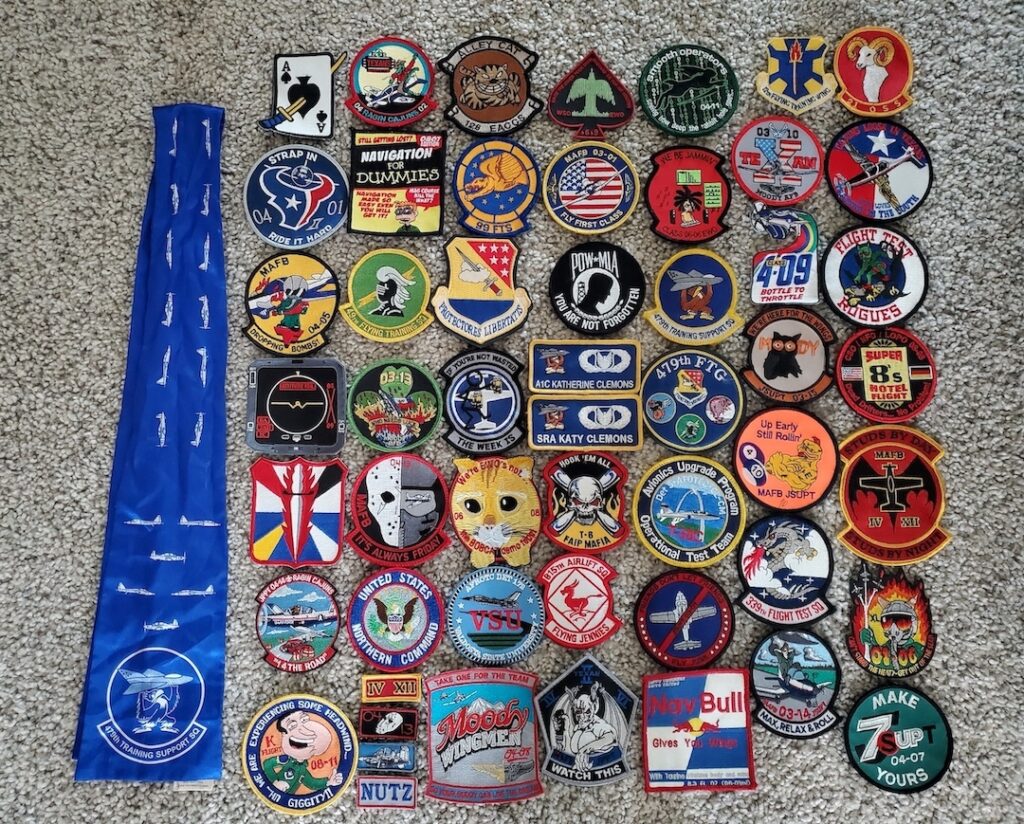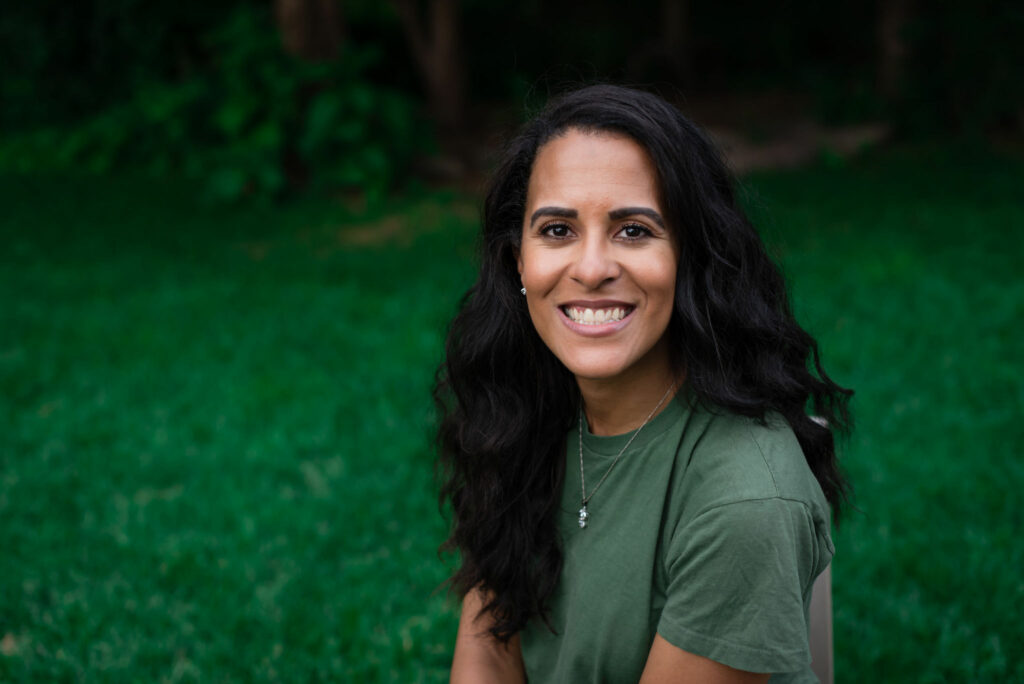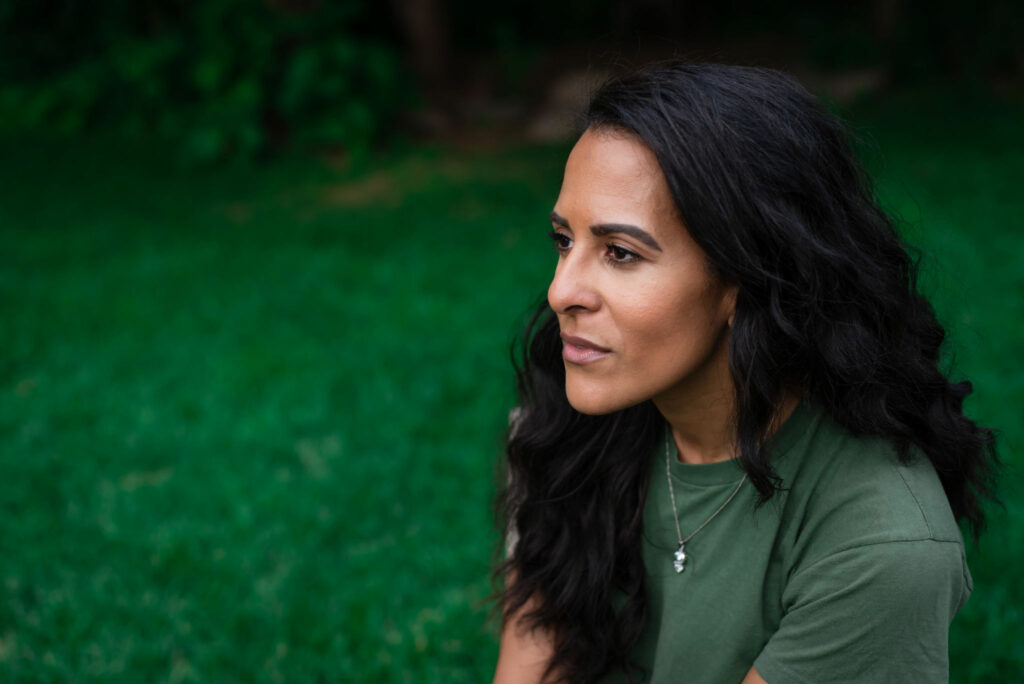AN UNEXPECTED JOURNEY OF SERVICE
If you had told Katy Doggett at the young age of 17 that she would be serving her country within the year, she might not have believed it. If you told her as a young Airman that she would end up being largely invisible as a Veteran after her service, she would have been surprised at that, too. Her story of service is a positive one. But like many other women, she has felt the sting of being an invisible Veteran more than once since separating from the military.
Joining the military was not even on her radar when she graduated high school in 1999. Doggett came from a relaxed family with extremely supportive parents who just wanted her to be happy, regardless of what she chose to do in life. As the daughter of an Army Veteran (her Dad), she was aware of the military, but had never thought of serving herself until her Mom suggested she take the ASVAB. “I said ok! What’s an ASVAB?” She was open-minded about it and decided to give it a try.
So at 18 years old and fresh out of high school, she took the military entrance exams and joined the Air Force.
PILOT LIFE SUPPORT
Doggett was lucky enough to pick her job and learned to provide life support for T-36 and T-38 pilots. “It sounds medical, but it’s not. I took care of all of their flying equipment—their helmet, masks, g-suit, parachute, seat kit—anything that would sustain their life while flying, or if they were to crash or had to evade.” Doggett thought she wouldn’t like it because it was very mechanical. It required using tools every day “and that just wasn’t my thing at the time, but I really loved it.”
UNDERSTANDING THE VITAL IMPORTANCE OF A GOOD FIT
She respected the importance of the work, as well. “Every little piece of a mask, every little piece of a helmet—if you don’t do it right, they could die. So you learn the importance of the little things, which make up the big things.”
That level of respect was cemented by one event in particular. “A requirement was that we had to fly in one of the jets we took care of.” This was done so that equipment maintainers could appreciate each piece fitting the way it does—everything from the mask and helmet to the g-suit. Understanding why drove home the importance of getting it right. “If the pilot needs to come in and have their mask tightened 80 times a week, it’s because it doesn’t fit right. Or the helmet would jiggle around because it wasn’t tight enough. That could take their attention away from flying, which could cause them to crash or miss a target.”
So she flew for a solid hour in a trainer fighter jet. She sat in a small space behind the pilot and tried in vain not to be sick.
It was not a flight designed to get from point A to point B—but a solid 60 minutes of pulling Gs on the test range. It involved continuous maneuvers with a lot of straight up and back down. She was sick more times than she could count. “It takes your breath away—it’s very, very exerting and you use all of your muscles to try to breathe.” As intense as it was, she looks back on it as a great memory. “Not everybody can say that they’ve done that. Especially not women.”
SERE SCHOOL
Doggett also counts herself lucky to have been through Air Force SERE training. She compared it to a more intense version of an escape room. “You know it’s controlled, you know you can get out, but it’s still scary.”
SURVIVE, EVADE, RESIST, ESCAPE
The hardest part for her was the simulated capture and torture. “You get dropped off in the middle of the woods, and you’re told to just run and not get captured. But obviously you get caught—that’s the whole point.” She was stripped, put in a dog cage, and hosed down with ice water. She doesn’t know how long she was there. It was likely only a few hours, although time seemed to stand still. “But you learn your boundaries. You learn what you can take and to know where your breaking point is, professionally but also personally. Because you don’t think you could ever go through all that.”


By her own admission, Doggett is not outdoorsy. Still, she appreciated learning survival techniques that not all service members are trained in, male or female. “I learned a lot of skills—how to read a compass, a map, look at terrain maps, how to get in and out of places, how to build a fire, how to kill a rabbit with my bare hands.” And her advice on eating bugs? “Chew ants really, really well because they like to crawl up your throat.”
After training as a student, Doggett went back to SERE school to learn how to teach refresher training to pilots. She loved it. “Learning how to train other people gave me a real insight on teaching. I don’t know if I’m the best teacher, but it was a lot of fun.”
LIFE AFTER THE AIR FORCE
Thankfully, the transition from Airman to Veteran was so seamless for Doggett that she barely noticed. “I literally signed myself out, got in my car and drove away.” Her husband is still in the Air Force, which is where they met. The Doggetts have been an active duty military family ever since.
RAISING MILITARY KIDS
“I have twins, and they have always known military life. They were born in Texas and at 92 days old, we packed them all up along with our house and moved to Las Vegas. They are true military kids through and through.”
Now in the 7th grade, her kids have clothes and friends from all over the world, with a broad range of schooling and adventures to match. “And they are so resilient—just mind-blowingly resilient. They don’t know strangers. They don’t know how to not deal with a situation.”
When it comes to their futures, her son and daughter already know one thing well: “They have two options after high school. College or military. They don’t have to do the same thing or go to the same place, but they know those are their only two options!” She hopes at least one of them will continue the family legacy of service. “My husband’s father was also in the military, so it would be really awesome if another generation went, but we’ll see.”
FINDING A NEW CAREER
After the Air Force, Doggett earned a degree in marketing and management but has spent the past seven-plus years working in finance for the government. “I like finance and I didn’t think I would. I love where I am now. Life is good.”
There are times when Veteran’s preference and disabled Veteran status have helped her to land a job. But for Doggett, her military experience is what helps her do well in the day to day. She finds that having a military background helps her to better navigate the world of government contracting and the other Veterans she often works with. “You gotta know military people to really deal with military people sometimes. We speak in acronyms and kind of have this expectation already that you’re gonna do what you’re supposed to do and be where you’re supposed to be. It’s just a different mindset.”
THE INVISIBLE VETERAN
When asked if she sees herself as a Veteran, Doggett is quick to say no. But it has less to do with her own self-perception and more with how society sees her. “I think it’s just because I always have to validate that I served.”
FOR VETERANS ONLY
The most stinging example came a few years ago. Doggett had just moved back from Germany and noticed they had Veteran parking spots at Lowes. “I was like, well this is cool—I’m gonna park there!” She stepped out of her car and was immediately accosted by a man in the parking lot. He pointed out that her husband was not there. She responded politely that she was aware. He kept talking, adamant that she was in the wrong. “Well you can’t park there. This is for Veterans only.”
I said, ‘I was in the Air Force, I did my time. I have a DD-214.’ He said, ‘No you don’t. They don’t look like you in the Air Force.’
Air Force Veteran Katy Doggett
She told the man she was a Veteran. He insisted she was not. But she didn’t back down. “I said, ‘I was in the Air Force, I did my time. I have a DD-214.’ He said, ‘No you don’t. They don’t look like you in the Air Force.’”
(NOT) STOLEN VALOR
It is not lost on her that some men are guilty of Stolen Valor—faking military service when they really just studied up on the culture—yet they often get away with it because people don’t question men who claim to be Veterans. “If a man says I was in the Marines, or I was in the Navy or whatever, nobody ever says prove it. But for women, it’s literally like, ‘Can you prove it? Show me.’” And sometimes even proof is still not enough for people who cannot comprehend that women serve in the military.
“So I still don’t park in that parking spot. I won’t. I probably should still park there because I earned it, but it made me feel ashamed. It made me feel small. It made me feel undeserving. And I didn’t like that feeling. So I thought, if a parking spot makes me feel that way, then I won’t take it.”
Not wanting to battle for validation makes her even less visible as a Veteran. “I just don’t bring it up. It’s a hope and a dream to be accepted at face value. But to have to validate four years of a blank check that you’ve written to the country you’re living in feels pretty shitty.”
If a man says I was in the Marines, or I was in the Navy or whatever, nobody ever says prove it. But for women, it’s literally like, ‘Can you prove it? Show me.’
Air Force Veteran Katy Doggett
I SEE YOU, MOM
Even her kids didn’t realize she served because they just don’t talk about it. “It didn’t occur to my son until last year. He went on a Boy Scout trip. I still had my survival book [from SERE School]. It’s this huge manual of how to escape and evade successfully.” She gave the book to her son and told him what it was. “And he had this look on his face like, WHAT?” She told him about being out in the elements, running and trying to escape; and having to kill a rabbit and eat bugs. “He just looked at me as if I had grown another head and was speaking another language.” And she realized that her son had never heard her talk like that.
“He gave me the biggest hug, and it felt like a different hug than just, ‘I love you Mom.’ It was more, I see you.”
It was meaningful for her to be able to share something like that with her son, especially for the short amount of time she was in. “For him to realize that his Dad is not the only one who has ever worn the uniform, it means something.”
LESSONS LEARNED
THE IMPORTANCE OF MULTIPLE MENTORS
“I’ve always said that I didn’t understand mentorship. I’ve never had [one] mentor in my life. For jobs or even parenting—I’ve gone to different people and I’ve looked at different people and what they do. But now I truly understand why it’s important to have multiple mentors, because there can’t just be one person who’s the end-all, be-all and that’s who you want to emulate in life. I think that mentorship is really important now, especially for the younger women out there. Not only in the military, but just in general.”
BEING A WOMAN IN A MAN’S WORLD
There were not many challenges that stood out to Doggett during her service, but working in a mostly male environment was an adjustment. “You kind of have to slough off the femininity sometimes. I didn’t always have a foul mouth but you kind of get one, just out of your desire and need to fit in. Was it a struggle at first? Yes, because I didn’t understand it. That whole ‘good old boys club’—I didn’t understand what that meant until I was in and really saw what that truly looked like and felt like.”
Now Doggett is more aware of how the energy and dynamics of a group change when there are no women in the room. She struggles with the either/or mentality of it. “Sometimes men stop how they’re talking when a woman comes in and sometimes they don’t, and I’m not really sure which one is better. I don’t want people to change who they are because of me. I also don’t want them to be fake.”
A SLOW TRICKLE
Despite a broader societal push toward gender equality and safety in the past few years, Doggett feels that any real change will take a very long time to trickle down into the workplace. With men still outnumbering women in many work environments, effecting meaningful change will require men’s full participation. “That’s not to say that men don’t care, and that’s not to say that all women do care, but unfortunately, it’s going to take people having a personal experience with injustice for them to want to help change. And that’s just across the board. As far as sexual harassment and inequality towards women and just overall being yucky to women… it’s gonna be a long time. It’s unfortunate, but it just is what it is.”
TRUE COLORS
Doggett is heartened to see more diverse representation in higher levels of leadership, both inside the military and out. But at the same time, she is disheartened by people’s responses. “You really start to see the true colors of people you thought you knew. Things I never thought I would hear or read or witness, I saw. In what I thought were my friends, neighbors, colleagues. Would I have rather lived in ignorance and never knew that’s how you felt, or do I like that I know who you truly are? I don’t know which one I’d rather have now. It’s very heartbreaking. It’s going to take a lot to change things.”
While not the case for everyone, discrimination was not something Doggett noticed personally in the military. “It’s interesting because I can pass for a lot of different ethnicities, so people don’t exactly know where I’m from! I can demystify it all—my biological father was black and my biological mother was white. My [adoptive] parents are both white. Because I’m mixed, and the environment I was raised in, I can easily blend in.” As a result it’s harder for people to make assumptions about her, and she is gracefully aware of the advantage that brings.
“I mean, my name is Katherine. I’ve always been very aware that it gives me an advantage, but I also try to make sure that I don’t take advantage. I think that people just don’t know, so they tiptoe until they do know. Then they know me and that’s that! By then they probably already either hate me or love me, and it has nothing to do with where I was born or who my parents are.”
LOOKING BACK ON HER SERVICE
Doggett is nostalgic about her time in the Air Force and speaks of it fondly. “Oh, to go back! I would do basic training again. It was a good time and I enjoyed it.” Much of her nostalgia is kept in a box filled with patches, coins and the few other bits of Air Force memorabilia she still has.


A lot has changed in the 16+ years since Doggett left active duty, and she’s optimistic about where the Air Force is headed. In 2020, Chief Master Sergeant JoAnne Bass became the first woman in history to hold the highest enlisted position of any US military service. “It’s really awesome, so we’re excited about that. Women are slowly and surely making their way into places of power, and I love that. I hope it continues.”
AN AIRMAN’S PERSPECTIVE ON THE SPACE FORCE
Late 2020 also marked the first anniversary of the Space Force, the 6th and newest branch of the US military. It started as the space component of the Air Force before breaking off into a separate service. Doggett found the idea of a Space Force to be a bit comical at first, but has since come around.
“It’s pretty interesting. I do think that’s where we need to go as far as surveillance goes. At the end of the day, cyber warfare is a huge thing. Yes, physical warfare, biological, nuclear—all of that is very, very serious. But if you take out the satellites, we don’t have internet, we don’t have phones. Talk about anarchy.”
“I think that it’s still so new it’s not gonna get the respect that it needs—it’s just gonna have to come with time. But I bet you when the Air Force broke off from the Army in the 40s, people thought the same thing. Like flying? Who cares about flying. We walk everywhere!”
“With all things that are new that we don’t understand, we try to trivialize them and poke holes until we realize—maybe this isn’t a bad thing. But it does sound funny. Space Force. There’s really no other word for it.”
Doggett was actually offered a job doing budgets for the Space Force. “I went in a different direction, but it would have been a really cool job to be in on the ground floor of a whole new branch of the military. So it will be interesting to see what comes of it in the next ten years. It will take some time, and I think most of that time will be for people to just get used to the idea of it.”
“A GOOD BASE FOR MY LIFE.”
Overall, serving in the Air Force was the best time of her life. “The military gave me structure. And I didn’t know I needed that sort of structure every day—somebody telling me to get up, and when I’m supposed to eat, and when I can go on vacation… I had a lot of those things already but it wasn’t consistent.” Before the Air Force, no one cared if she called in sick to work. But being in the military was different. “If you don’t show up, somebody else’s life could be on the line.”


“Of course there were bad times, and there were exceptional times, and the mundane, nine to five… but overall it was great. It just really gave me a good base for my life, and I refer to it constantly.”
Despite the assumptions and criticisms she faces at times, and the inability for some to see her as a Veteran, Doggett is proud of her service and certain that she belonged in the club. “My blank check was the same as any male’s. I would have given my life, just like any son out there. It’s all the same. Four years compared to twenty years is different, but the check is still the same.”
Katy Doggett served four years in the US Air Force, separating as a Senior Airman in 2004. She is the first—and so far only—woman in her family to have joined the military.





I remember those days. Some quite fondly and others not so much. I experienced
The “you don’t look like you are in the military” even while serving in a field unit. Of course I went in when it was still Women’s Army Corp and women soldiers had negative image. Change is long and hard especially for female soldiers. The one famous comment was “you have to work twice as hard to be half as good as a man” or you have 3 strikes against you “you are black, female and at the time sole parent.” Yes “you aren’t veteran so you can’t park there” comments .Female Veterans you earned the right So hold your head up high and keep demanding your recognition. My son came home from school one day and said kids were saying your momma wears combat boots, thinking that would upset him, he turned to them and said “ Yes She Does” and walked off. I must admit I chuckled a bit reading your story because I was so stubborn I stuck it out for 21 years between active and reserve, The more the military did to me the more my back went up.
Change is definitely long and hard, but we are making progress. Thank you, Betty for sharing your own experiences as a woman in the military.
Pingback: Lady Vet Blog — Help Us Show Others that Veterans Look Like You
I was out with my then boyfriend and his male friend and they asked for the veterans discount and the man said sure thing. I asked for one as well and the man at the register questioned me with shallow remarks about me being too cute to be in the military and made me show my CAC to get the discount.
It was then that I realized I would always be questioned when I was out of uniform as active duty and a veteran which I am now, just because I’m a woman.
There is definitely a lot of work left to do. It is Lady Vet’s mission to help change the assumption that Veterans are always men. When you walk into a room or step in line and people are looking for the Veteran, we want them to assume that it could be you. Thank you for sharing your experience, Sister!